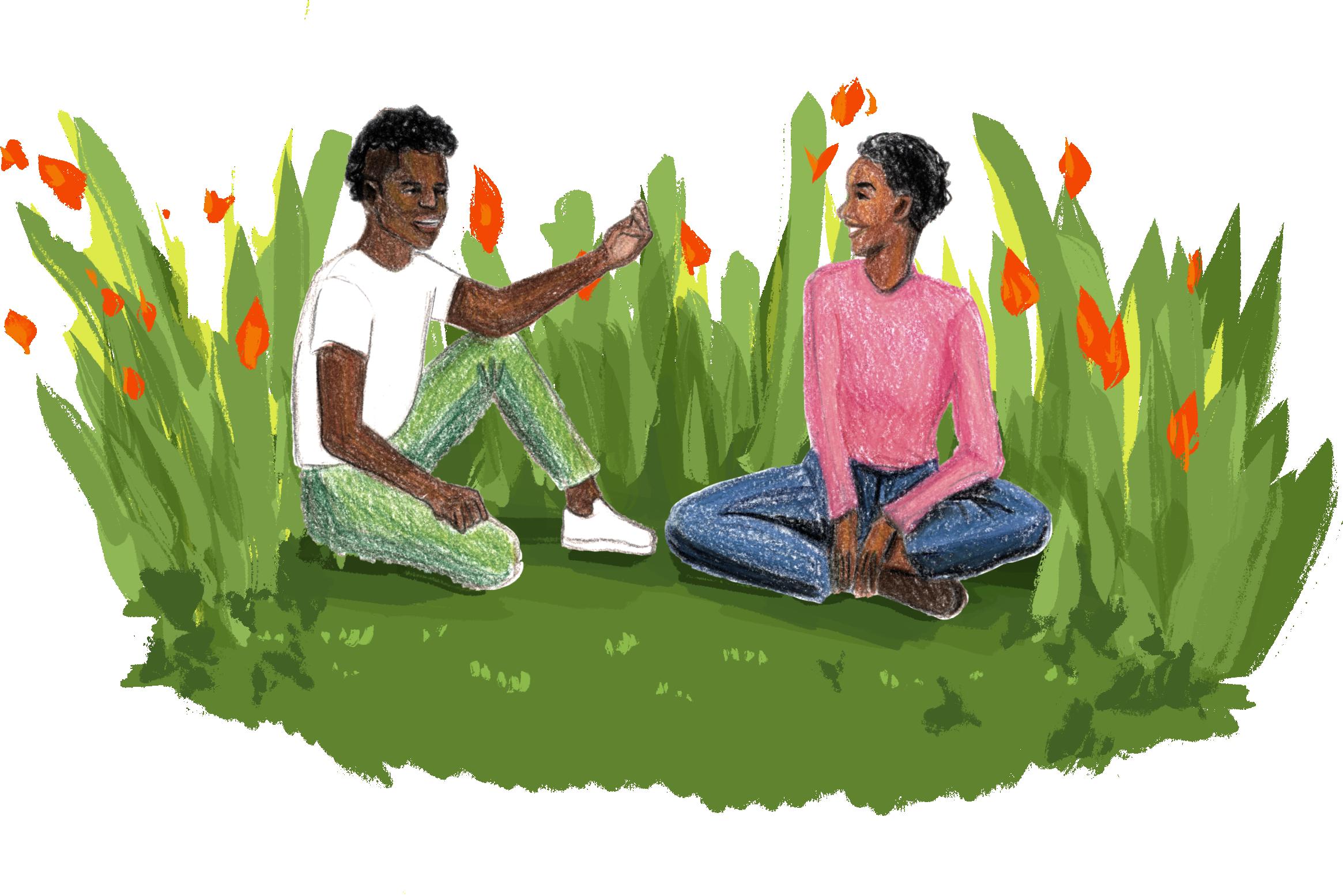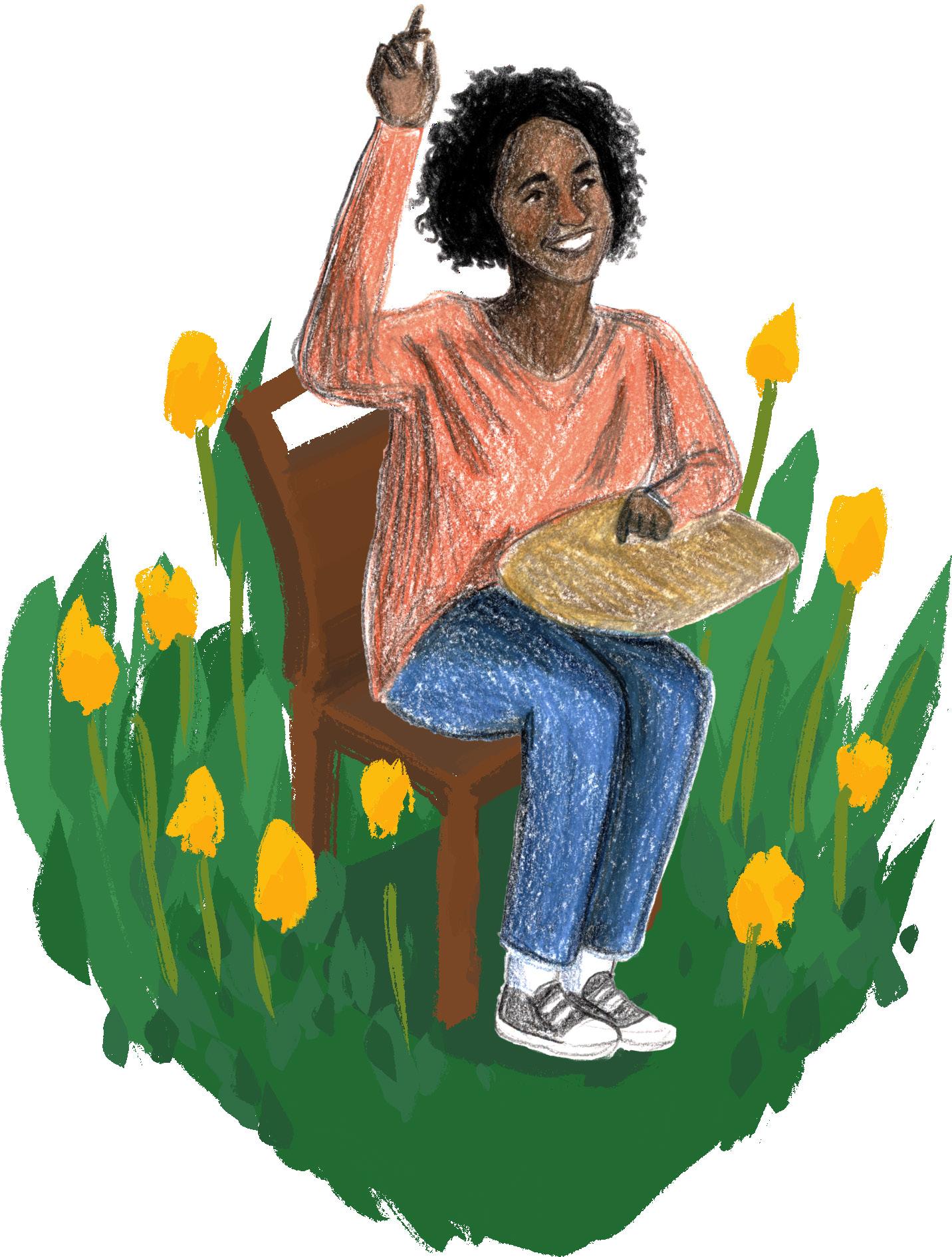
9 minute read
CENTERING BLACK EXPERIENCES
EXPLORING ANTI-RACIST PROGRAMMING AT TUFTS
By Seun Adekunle
Advertisement
The civil unrest of 2020, following the murder of George Floyd by policeman Derek Chauvin, brought renewed attention to the racism believed to be embedded in 21st century American institutions. Tufts University, like a myriad of other academic institutions, proclaimed its support for the Black Lives Matter movement. In 2021, Tufts announced its newfound “work to build a better Tufts where we will collaborate to advance equity, inclusion, healing, and justice for our own community, and… the wider world.” Tufts appears to have taken steps towards this goal by “committing at least $25 million of university resources, over five years, to support the efforts” enumerated in the five workstreams held between 2020 and 2021. These include, among others, “anti-racism education,” “compositional diversity,” and a focus on representing “values of Diversity, Equity, and Inclusion” through public art as well as rebuilding campus safety and policing. Despite this, some Black students and faculty feel that the university’s rhetoric has largely remained unsubstantiated. Nevertheless, these students and faculty members assert that the development of that ideal community is not only achievable, but imperative.
The experiences of Black students at Tufts have ranged from wholly healthy, fascinating, and enriching episodes to ones mired with both camouflaged and overt prejudice. René LaPointe Jameson, a senior at Tufts, wrote in a statement to the Tufts Observer that although Tufts has provided her an “overall great college experience… [with] amazing relationships, opportunities, and skills,” she has been “repeatedly hurt” by the upholding of “elitism and racism inherent to academic institutions like Tufts.” She expounds on her challenges, revealing that she constantly navigates microaggressions, racism, and reminders that she exists “in a space not meant to include [her].” She further explained that “as a Black student, [she has] to do so much more labor and thinking than [her] white peers, and it is something never acknowledged or compensated.”
Several students also revealed that their experiences within the Black community at Tufts have acted as a redeeming factor. Olly Ogbue, a sophomore and Co-Communications Chair of the Black Student Union, wrote in a statement to the Tufts Observer that Tufts has largely been an upgrade from her predominantly white high school because of the connections she has made with other Black students. “My relationships with other Black students are definitely my strongest. Having that community and affirmation is really helpful in navigating my experiences as a Black person on this campus,” wrote Ogbue. However, Ogbue has still encountered incidents that “have made [her] hyper-aware of [her] Blackness.”
Wanci Nana, a sophomore and member of the Black Men’s Group, an organization which works to provide “programs that promote a sense of integrity, pride, and honor for the Black community,” similarly wrote in a statement to the Tufts Observer that the diverse patchwork-like community at Tufts


has instilled in him a penchant for personal growth and that his “experience has [been] and will continue to be life changing.” Chidilim Menakaya, a junior, wrote in a statement to the Tufts Observer that Tufts has mostly been a “welcoming and comfortable space” wherein she has been “surprised by the amount of professors who care about creating inclusive spaces.” Conversely, Amma Agyei, senior and Tufts Community Union President, wrote in a statement to the Tufts Observer that her experience at Tufts “has had its ups and downs,” with the latter consisting of numerous experiences with students and faculty who perceive her as “inferior to them.” Ultimately, despite the differences in Black experiences on campus, the allure

of community as well as affirmation remains steadfast.
Culturally, the recognition of Black History Month remains an illuminative period wherein a critical spotlight is shined on the efforts of institutions to create invigorating environments that celebrate Black achievements and validate Black experiences. Dr. H. Adlai Murdoch, Director of Africana Studies and a professor in the Department of Romance Studies, wrote in a statement to the Tufts Observer that some events scheduled at Tufts do “unearth and highlight historical figures and moments that are typically glossed over.”
Other events scheduled are shallow and unaffecting, according to Nana, who wrote that the topics momentarily highlighted during Black History Month are relevant during other months besides February, rendering the brevity of these events dubious. Similarly, LaPointe Jameson wrote that she does not participate in events during Black History Month outside of the Africana Center, as they “seem performative or will not provide me with the tools” needed to further effect change. She expands on this, arguing that “Tufts wants students to be critical thinkers… but not if we start to question them… and how they operate in ways that enforce racism, classism, and ableism.”
For example, she criticized the treatment of dining and custodial workers and human rights advocacy groups, such as Students for Justice in Palestine, as she feels their treatment communicates the institution’s attitudes towards developing safer environments for marginalized students and substantively challenging systems of oppression they inadvertently, or otherwise, perpetuate. The events held by Tufts University during Black History Month seem to be viewed by students in two vast-
ly different categories: the constructive and informative events hosted by the Africana Center and the superficial others.
The acknowledgement and celebration of Dr. Rev. Martin Luther King Jr, Coretta Scott King, and their accomplishments presents another panorama through which to explore how Tufts University lauds Black heroes and emboldens their students to follow the charge of these figures. Tufts holds community action days in which students are given the opportunity to “critically engage with MLK’s vision of a ‘revolution of values’ towards a ‘person-oriented society.’”
LaPointe Jameson wrote that although she enjoyed the discussions at these events, she believes that these events are not beneficial to the Black student body because Tufts has not fully committed to funding processes that develop equitable environments. “I am personally tired of all the discussions, all the committees, [and] all the focus groups Tufts wants Black students to do for free to fix things,” LaPointe Jameson wrote. “We’ve been telling them what to do to make this place more equitable for years, and they didn’t listen until white people saw racial injustice as a legitimate problem in 2020. What does it say about a place that does not take racial injustice seriously until it is validated by white people?”
Another event series for MLK Day are the MLK Symposia—panels that feature Black local activists and student leaders in hopes of further celebrating the values of MLK. Agyei wrote that the MLK Symposia have produced speakers who “inspire [her] to achieve greater things and reach for [her] goals,” and that, on the whole, “they are definitely beneficial to the Black community at Tufts.” Moreover, Dr. Murdoch draws parallels between the MLK sympo-
sia and some of the events scheduled during Black History month. He wrote that they increase “students’ awareness of the key role played by Black people in the US and world history” and “serve as a counter to US-centered histories that tend to stress the accomplishments of select groups, of which Blacks are typically not a part.”
Black History Month and celebrations of MLK; however, are temporary, intersecting periods in which Tufts purportedly highlights and centers Black issues and voices. Black students have looked for other structural changes, particularly within the classroom, that fortify their understanding of global Black “experiences… that [carry] so much knowledge,” as Nana puts it.
One method adopted by Black students in pursuit of this mission is taking classes in the Department of Studies in Race, Colonialism, and Diaspora (RCD) and other classes that utilize non-Western perspectives to analyze history, culture, and intellectual trends. Dr. Murdoch, who teaches numerous classes for the



Department of RCD, wrote that students tend to be “surprised [by] the information that they encounter,” and that, particularly, Black students are “very responsive to, and even inspired by, information on Black history and culture” discovered in these classes.
LaPointe Jameson, who studies environmental engineering with a “self-designed focus on race and justice,” wrote that she took a class called Colonialism in Global Perspective which made her a “better systems thinker,” an indispensable tool as an engineer. “It also taught me that most, if not all, of our environmental issues have social roots such as capitalism, colonialism, and white supremacy; degradation of the Earth is intertwined with degradation of the planet,” LaPointe Jameson wrote. This understanding has enriched her time at Tufts, community-building work, and engagement with different communities off-campus. Agyei writes that her professors at the Department of RCD were nicer and more understanding than her other professors and that “those classes were thought-provoking” and rife with enlightening discussions. Similarly, Nana writes that the classes helped him “dive deeper into [his] identities as both a Black man and an African American man as well.”
Rob Mack, Associate Provost and Chief Diversity Officer at Tufts, wrote in an email to the Observer that “[they] are proud of the work the Tufts community has done so far and continues to do,” and that “[they] saw our community step into the space of shared accountability for this work,” in reference to the implementation of “many of the workstreams’ 181 recommendations.”
Despite these developments, many continue to feel that there remains a large gap between the ideal humanizing and uplifting environment that Tufts promises its Black students and the reality at present. Dr. Murdoch highlights the fact that an increase in the proportion of Black students with varying backgrounds has excited an interest in Black students about African history, culture, and other perspectives influenced by Black peoples, a process he believes has been crucial in the “continuing development of Tufts and its student body.” He further stressed that Tufts should increase “the number of faculty offering courses related to American and international facets of the Black experience,” covering all regions whose histories are intertwined with Black history, as well as to hire Black faculty with expertise in other areas, arguing that they “should not be an anomaly or an exception, as they are now.”
LaPointe Jameson seconded this sentiment: “better recruitment, hiring, and retention of Black faculty and administrators,” as well as “hiring more Black professionals and staff for CMHS (Counseling and Mental Health Services)” at Tufts cultivates a healthy and safe environment for Black students. She added that “considerations of systems of oppression and equity” should be integrated into all classes, more money should be invested into the Africana Center and Center for STEM Diversity, and there should be better systems of accountability for racist professors and students. Ogbue wrote that “more work must be done to center Black voices and take action steps to fulfill what the community actually needs instead of empty words.”
Although, as Ogbue argues, Tufts has hitherto supported its Black students “more in name than in action,” the prospect of change remains unhindered. LaPointe Jameson wrote that her criticism “comes out of care for [Tufts] to grow urgently so it doesn’t perpetuate further harm,” and that she holds an “optimistic belief that [Tufts] can do better for [her] and other marginalized students.”











